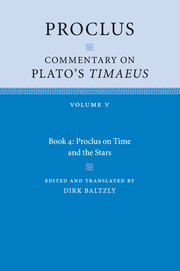III - The Tenth Gift of the Demiurge: The Cosmos is Filled With All the Kinds of Living Being
Published online by Cambridge University Press: 30 June 2022
Summary
Introduction, Tim. 39e4–6
But with respect to the fact that it did not yet contain all the living beings that have been generated within it, so far it was still dissimilar. Wherefore, of course, he completed what still remained, impressing upon it the nature of the paradigm. (Tim. 39e4–6)
It is clear that since he is always assimilating the cosmos to the Living Being Itself, Plato simultaneously has made mention of this three times: making this universe one of a kind (monogenes, 31b3), finishing it off with eternity (37d3–9), and rendering it all-perfect (pantelˆes, 37d4). And plausibly so, for the Living Being Itself is characterised by these three things – by being one of a kind, eternal, and all-perfect. Since it has been ranked in the third order among the intelligibles, it has the property of being one of a kind as a result of the first [order] (in accordance with which there is the One-Being), while it has the property of being eternal as a result of the second (in accordance with which there is Eternity), but it has the property of being all-perfect as a result of itself. It is necessary and not a digression to see what this property of being all-perfect consists in.
Now since wholeness is triple, as we have frequently noted, and originates from on high among the intelligibles themselves, and since this cosmos is an image of the finest of the intelligibles, it was also necessary that it be established in accordance with each one of the kinds of wholeness – first, in accordance with that which is before the parts; second, in accordance with that which is composed of the parts; and for the same reason with respect to the remaining one. Now the Demiurge himself has already ordered [the cosmos] in terms of the first form of wholeness, for the first thing that it has become is ‘a living being endowed with soul and intellect’ (Tim. 30b8), since when that which was moved in a discordant and disorderly fashion was arranged and received order, then soul, intellect and divine unification supervened.
- Type
- Chapter
- Information
- Proclus: Commentary on Plato's Timaeus , pp. 176 - 257Publisher: Cambridge University PressPrint publication year: 2013

